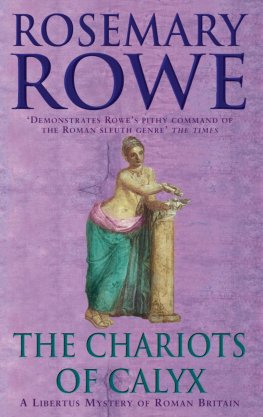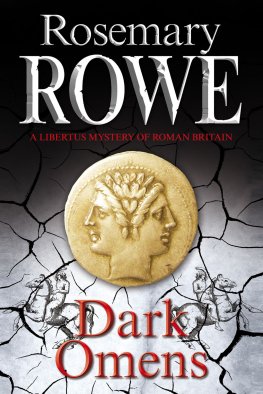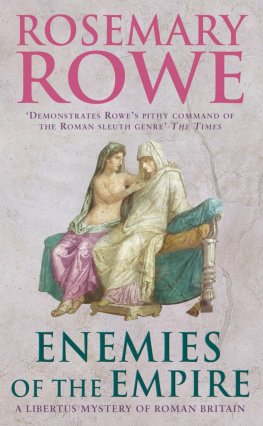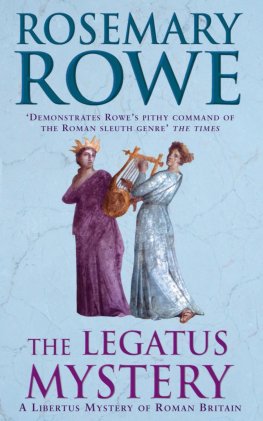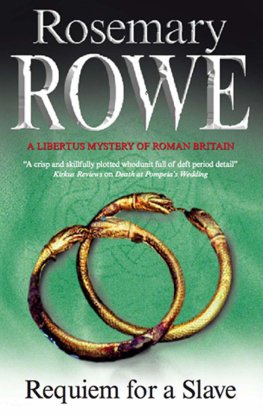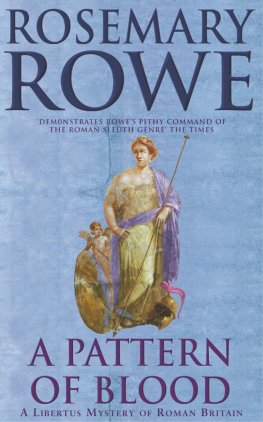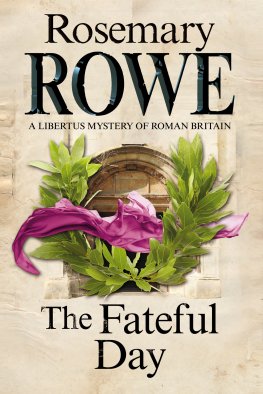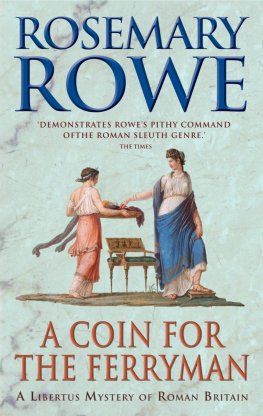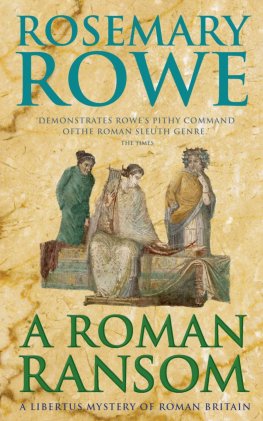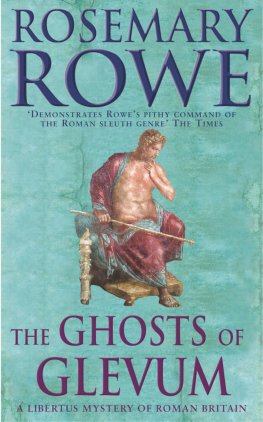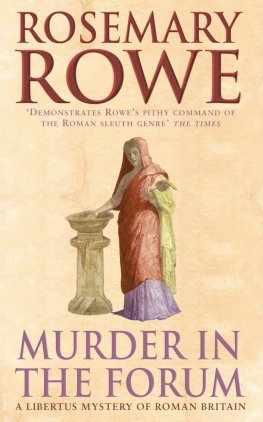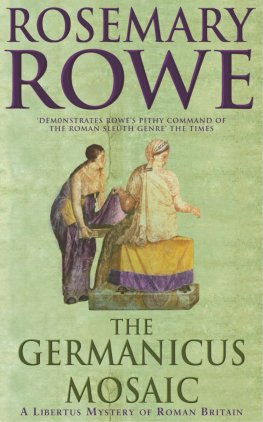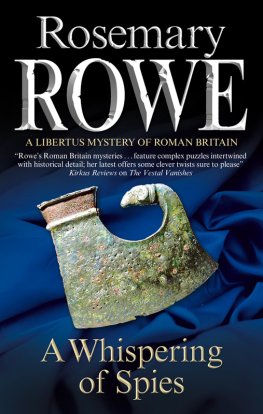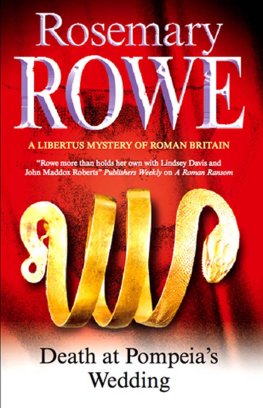Rosemary Rowe - The Chariots of Calyx
Here you can read online Rosemary Rowe - The Chariots of Calyx full text of the book (entire story) in english for free. Download pdf and epub, get meaning, cover and reviews about this ebook. year: 2002, publisher: Headline, genre: Detective and thriller. Description of the work, (preface) as well as reviews are available. Best literature library LitArk.com created for fans of good reading and offers a wide selection of genres:
Romance novel
Science fiction
Adventure
Detective
Science
History
Home and family
Prose
Art
Politics
Computer
Non-fiction
Religion
Business
Children
Humor
Choose a favorite category and find really read worthwhile books. Enjoy immersion in the world of imagination, feel the emotions of the characters or learn something new for yourself, make an fascinating discovery.
- Book:The Chariots of Calyx
- Author:
- Publisher:Headline
- Genre:
- Year:2002
- ISBN:9781472205087
- Rating:5 / 5
- Favourites:Add to favourites
- Your mark:
- 100
- 1
- 2
- 3
- 4
- 5
The Chariots of Calyx: summary, description and annotation
We offer to read an annotation, description, summary or preface (depends on what the author of the book "The Chariots of Calyx" wrote himself). If you haven't found the necessary information about the book — write in the comments, we will try to find it.
The Chariots of Calyx — read online for free the complete book (whole text) full work
Below is the text of the book, divided by pages. System saving the place of the last page read, allows you to conveniently read the book "The Chariots of Calyx" online for free, without having to search again every time where you left off. Put a bookmark, and you can go to the page where you finished reading at any time.
Font size:
Interval:
Bookmark:
Rosemary Rowe
The Chariots of Calyx
Prologue
In the opulent town mansion of Caius Monnius Loveinius, one of the wealthiest officials in Londinium, everyone was asleep. Or almost everyone.
It had been a Roman holiday the birthday of one of the deified imperial dead (or perhaps not dead, since emperors were now officially immortal) and Caius Monnius, like everyone else of importance, had marked the occasion with a feast.
But the remains of last nights banquet had now been cleared away: scores of slaves, for whom a Roman holiday was no holiday at all, had worked for hours by oil-light moving the last platters from the tables and sweeping scraps of roast peacock from the mosaic floors, but now even they had finished. The fine pottery eating bowls had been scrubbed clean with sand and ashes, the oil-lamps replenished for the night, and the elaborate food libation to the gods fragments of gilded swan and of delicate honeycake had been duly shared, as custom permitted, and the weary servants had gone gratefully to their sleeping spaces.
The invited revellers were long since gone home, replete and benevolent in their carried litters: while the master of the house, stupid with lust and wine, staggered to his ladys quarters and by the light of two lamps held by a pair of unwilling slaves, roughly and repeatedly violated his beautiful young wife. Then he too had lumbered to his bed in the adjoining room, posted one slave to sleep outside his door and the other outside his wifes, and had fallen at once into a drunken slumber without even removing his toga.
Elsewhere, the whole household was asleep. Even the doorkeeper had succumbed to the powerful draught he had unwittingly taken in his glass, and had nodded into oblivion, still sitting on his stool, his head resting against the painted plaster wall of his waiting niche. In the darkened corridors nothing moved except the flickering light of a few feeble oil-lamps suspended from the rafters. The tiny wicks, in their open bowls, cast a faint glow upwards but did little to illuminate the area beneath them, and most of the exquisite tiled floor and elegant passageway of interconnecting rooms was a pool of darkness and sinister shifting shadows.
Strange, since in any well-run city household there is always at least one servant awake and watchful, to keep guard.
But tonight there was no one watching. No one to see a single shadow, darker than the rest, detach itself from the gloom of the librarium and move silently and stealthily towards the room where Caius Monnius lay. It hesitated a moment outside the ladys door, guarded by the sleeping female slave. The servant was old, and breathing heavily. The shadow bent over her, but the woman did not so much as stir.
The shadow moved on to the masters room. The wretched page sighed and turned slightly in his dreams. The shadow paused. There was no one to see the hands that flashed out suddenly, the fingers that lifted the head by the hair, or the savage tightening of the close-linked silver chain around the throat of the unconscious slave. The sleeping draught had done its job so well that the boy did not even give a grunt as he died.
The shadow let the boy fall gently back, and stepped silently over the lifeless figure into the room beyond. There was a long, long pause. Caius Monnius was a substantial man, and he did not die without a struggle. But a pillow muffled his gurgling and at last the woven chain its three strands supple and strong yet together no wider than a mans finger accomplished its deadly work again.
Then the shadow edged soundlessly to the connecting door which led to the bedroom of the lady. The door inched open. A knife gleamed dully in the gloom. The shadow moved towards the bed.
But the lady Fulvia was not asleep. She lay back on her pillows, eyelids shut, and as the knife was raised she seemed to tense. Then, as the blade came down, she moved her arm so that the savage edge merely slashed across her flesh. She opened her eyes and stared about, but before she could even force herself upright gasping with pain and clutching at the wound she knew she was alone. She heard the knife clatter to the floor. And then the lady screamed, and kept on screaming, so loudly that the sleeping servants in the attics woke.
A moment later the stairs rang with the sound of their footsteps, and the passages glowed in the flare of their hastily lighted tapers. A dozen slaves rushed into the ladys room, to find her sitting up on her bed, clutching her blankets to her with bloodied hands. She was pale and shivering, and gesturing wordlessly towards the inner door and to the bloodstained knife which still lay glittering on the floor nearby.
The master! someone shouted, but Caius Monnius would never come to his wife again. He lay slumped upon his bed, the pillow by his side, with his crushed festal wreath still grotesquely on his head and the chain so tightly wound around his neck that here and there the hammered metal had bitten into flesh, and blood was oozing between the narrow links. The shutters at the window-space had been forced open. A servant cried out in horror.
Fulvia struggled to rise. I must attend my husband! But she collapsed into the arms of her slave-woman.
Frightened slaves rushed outside at once into the dark. The garden was walled, but the lights of their torches soon revealed a crude ladder set up against the wall in the furthest corner. There was no one in the garden: no one in the street. The shadow, whoever it was, had merged into obscurity and vanished.
Of course, I didnt know all this at the time. Like every other honest citizen in Londinium, I was fast asleep in bed.
Chapter One
Unlike most of those respectable citizens, however, it was not my own bed that I was occupying. In fact when the household slave arrived to call me, it took me a few moments to work out where I was.
Citizen? Libertus? Pavement-maker? I came to my senses to find somebody calling my name. Unnecessarily loudly and close to my ear, I thought. I had been dreaming that I was an emperor, resting on cushions of down.
I opened one eye and shut it again instantly. Thats a powerful oil-lamp, I thought crossly, as the brightness seared my sight. What idiot had brought it inches from my eyes?
Longinius Flavius Libertus! The voice was insistent. Are you awake?
I forced the eyelid open again. No oil-lamp, I realised painfully, just sunlight streaming through the open shutters. But my fuddled brain refused to deal with the implications of that. I simply turned on my pillows and tried to drift back into oblivion, muttering crossly, Go away.
Citizen mosaic-maker! His Excellence the Governor enquires if you have slept.
That woke me. I sat up in bed so suddenly that I narrowly escaped oversetting the bowl of scented water that the slave was carrying. For a moment I goggled at the painted walls, the carved table, the fine wooden shutters standing open at the window-space, the terracotta paving on the floor. And this bed! Not cushions of down, exactly, but the next best thing a proper bed with a woollen mattress on a splendid stretched goatskin base. A far cry from my usual humble pile of rags and reeds. And the young slave at my bedside was not my own cheerfully scruffy Junio, but an elegant stranger in an exquisitely bordered tunic.
Of course! This was not the wretched attic over my mosaic workshop in Glevum. I was a house-guest of His Supreme Excellence Publius Helvius Pertinax, supreme commander of the legions and governor of all Britannia. I was in his palace in Londinium, and judging by the broad daylight pouring through the windows I was guilty of a serious breach of etiquette. Most Roman households rise at dawn, and all important citizens expect to begin the day by receiving their clientes
Font size:
Interval:
Bookmark:
Similar books «The Chariots of Calyx»
Look at similar books to The Chariots of Calyx. We have selected literature similar in name and meaning in the hope of providing readers with more options to find new, interesting, not yet read works.
Discussion, reviews of the book The Chariots of Calyx and just readers' own opinions. Leave your comments, write what you think about the work, its meaning or the main characters. Specify what exactly you liked and what you didn't like, and why you think so.

